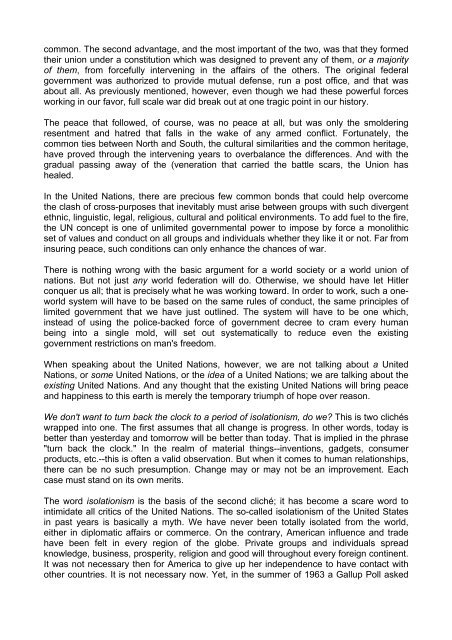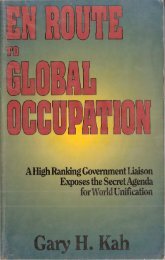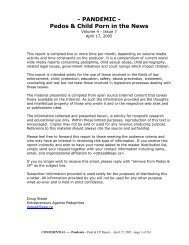G. Edward Griffin - The Fearful Master - PDF Archive
G. Edward Griffin - The Fearful Master - PDF Archive
G. Edward Griffin - The Fearful Master - PDF Archive
Create successful ePaper yourself
Turn your PDF publications into a flip-book with our unique Google optimized e-Paper software.
common. <strong>The</strong> second advantage, and the most important of the two, was that they formed<br />
their union under a constitution which was designed to prevent any of them, or a majority<br />
of them, from forcefully intervening in the affairs of the others. <strong>The</strong> original federal<br />
government was authorized to provide mutual defense, run a post office, and that was<br />
about all. As previously mentioned, however, even though we had these powerful forces<br />
working in our favor, full scale war did break out at one tragic point in our history.<br />
<strong>The</strong> peace that followed, of course, was no peace at all, but was only the smoldering<br />
resentment and hatred that falls in the wake of any armed conflict. Fortunately, the<br />
common ties between North and South, the cultural similarities and the common heritage,<br />
have proved through the intervening years to overbalance the differences. And with the<br />
gradual passing away of the (veneration that carried the battle scars, the Union has<br />
healed.<br />
In the United Nations, there are precious few common bonds that could help overcome<br />
the clash of cross-purposes that inevitably must arise between groups with such divergent<br />
ethnic, linguistic, legal, religious, cultural and political environments. To add fuel to the fire,<br />
the UN concept is one of unlimited governmental power to impose by force a monolithic<br />
set of values and conduct on all groups and individuals whether they like it or not. Far from<br />
insuring peace, such conditions can only enhance the chances of war.<br />
<strong>The</strong>re is nothing wrong with the basic argument for a world society or a world union of<br />
nations. But not just any world federation will do. Otherwise, we should have let Hitler<br />
conquer us all; that is precisely what he was working toward. In order to work, such a oneworld<br />
system will have to be based on the same rules of conduct, the same principles of<br />
limited government that we have just outlined. <strong>The</strong> system will have to be one which,<br />
instead of using the police-backed force of government decree to cram every human<br />
being into a single mold, will set out systematically to reduce even the existing<br />
government restrictions on man's freedom.<br />
When speaking about the United Nations, however, we are not talking about a United<br />
Nations, or some United Nations, or the idea of a United Nations; we are talking about the<br />
existing United Nations. And any thought that the existing United Nations will bring peace<br />
and happiness to this earth is merely the temporary triumph of hope over reason.<br />
We don't want to turn back the clock to a period of isolationism, do we? This is two clichés<br />
wrapped into one. <strong>The</strong> first assumes that all change is progress. In other words, today is<br />
better than yesterday and tomorrow will be better than today. That is implied in the phrase<br />
"turn back the clock." In the realm of material things--inventions, gadgets, consumer<br />
products, etc.--this is often a valid observation. But when it comes to human relationships,<br />
there can be no such presumption. Change may or may not be an improvement. Each<br />
case must stand on its own merits.<br />
<strong>The</strong> word isolationism is the basis of the second cliché; it has become a scare word to<br />
intimidate all critics of the United Nations. <strong>The</strong> so-called isolationism of the United States<br />
in past years is basically a myth. We have never been totally isolated from the world,<br />
either in diplomatic affairs or commerce. On the contrary, American influence and trade<br />
have been felt in every region of the globe. Private groups and individuals spread<br />
knowledge, business, prosperity, religion and good will throughout every foreign continent.<br />
It was not necessary then for America to give up her independence to have contact with<br />
other countries. It is not necessary now. Yet, in the summer of 1963 a Gallup Poll asked



![Robert T McQuaid [rtmq@stn.net] Sent: Friday, October 29, 2004 12 ...](https://img.yumpu.com/51070071/1/190x245/robert-t-mcquaid-rtmqstnnet-sent-friday-october-29-2004-12-.jpg?quality=85)







